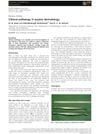 March 2018 in “Benha Journal of Applied Sciences”
March 2018 in “Benha Journal of Applied Sciences” Women with telogen effluvium have lower levels of VEGF, which may contribute to their hair loss.
 3 citations,
May 2018 in “Reproductive Sciences”
3 citations,
May 2018 in “Reproductive Sciences” The drug BAY 1158061 is safe, well-tolerated, and shows potential for treating diseases related to prolactin.
 3 citations,
January 2017 in “Indian journal of health sciences and biomedical research KLEU”
3 citations,
January 2017 in “Indian journal of health sciences and biomedical research KLEU” Low iron levels are significantly linked to hair loss in women.
 January 2017 in “Journal of clinical & experimental dermatology research”
January 2017 in “Journal of clinical & experimental dermatology research” Low ferritin levels might be linked to telogen effluvium, but vitamin D levels are not.
 3 citations,
January 2017 in “Journal of Pakistan Association of Dermatology”
3 citations,
January 2017 in “Journal of Pakistan Association of Dermatology” Women with certain types of hair loss may have low iron levels, and iron supplements could help.
 1 citations,
May 2017 in “Journal of The American Academy of Dermatology”
1 citations,
May 2017 in “Journal of The American Academy of Dermatology” People with alopecia areata often have lower vitamin D levels than healthy people.
 10 citations,
May 2017 in “PLOS ONE”
10 citations,
May 2017 in “PLOS ONE” Men and premenopausal women in Korea show different patterns in iron and vitamin D levels, with no clear pattern for postmenopausal women.
 January 2017 in “Egyptian Journal of Dermatology and Venereology”
January 2017 in “Egyptian Journal of Dermatology and Venereology” Iron deficiency may contribute to chronic hair loss in premenopausal women.
 January 2017 in “Turkiye Klinikleri Journal of Dermatology”
January 2017 in “Turkiye Klinikleri Journal of Dermatology” Low vitamin D levels, not ferritin levels, were found in patients with hair loss condition telogen effluvium.
 1 citations,
June 2016 in “Equine Veterinary Education”
1 citations,
June 2016 in “Equine Veterinary Education” The document concludes that using the right diagnostic methods and careful sample handling is crucial for accurately diagnosing horse skin diseases.
 10 citations,
January 2016 in “Dermatologic Clinics”
10 citations,
January 2016 in “Dermatologic Clinics” Some acne medications have side effects; doctors should educate patients and may not need to do frequent lab tests for all.
February 2021 in “INTERNATIONAL JOURNAL OF SCIENTIFIC RESEARCH” Low zinc and copper levels may indicate Telogen Effluvium.
 January 2016 in “International Journal of Research in Medical Sciences”
January 2016 in “International Journal of Research in Medical Sciences” Low iron, low thyroid function, and stress are linked to excessive hair shedding in women.
 11 citations,
January 2014 in “Egyptian Journal of Dermatology and Venereology”
11 citations,
January 2014 in “Egyptian Journal of Dermatology and Venereology” Women losing hair might have lower levels of vitamin D.
 March 2014 in “Journal of The American Academy of Dermatology”
March 2014 in “Journal of The American Academy of Dermatology” Vitamin D deficiency is common in temporary hair loss, and stress is often a suspected cause.
 January 2004 in “Dermatologic Surgery”
January 2004 in “Dermatologic Surgery” Storing hair follicles in a special buffer with certain inhibitors can increase hair growth and improve transplant results.
 177 citations,
December 2002 in “The Lancet”
177 citations,
December 2002 in “The Lancet” Fibrinogen/LDL apheresis may improve speech perception in sudden hearing loss, especially for those with high fibrinogen and LDL levels.
1 citations,
January 2018 in “Annals of medical research” No link found between blood groups, Rhesus factor, and ferritin levels in women with hair loss.
Letrozole combined with Cabergoline improves ovulation and pregnancy rates in women with PCOS and high prolactin levels compared to Letrozole alone.
 42 citations,
July 2015 in “Journal of The American Academy of Dermatology”
42 citations,
July 2015 in “Journal of The American Academy of Dermatology” The conclusion is that oral contraceptives and antiandrogens can treat hirsutism and acne in women with cutaneous hyperandrogenism, but more research is needed for effective treatments, especially for hair loss.
September 2022 in “Journal of The American Academy of Dermatology” Older women taking spironolactone for hair loss may need yearly potassium checks due to a higher risk of hyperkalemia.
1 citations,
October 2022 in “Evidence-based Complementary and Alternative Medicine” Traditional Chinese Medicine may help treat hair loss but needs more research.
 December 2020 in “International Journal of Research in Dermatology”
December 2020 in “International Journal of Research in Dermatology” Many dermatologists in India find serum peptide formulations effective for treating hair loss.
 October 2024 in “INTERNATIONAL JOURNAL OF SCIENTIFIC RESEARCH”
October 2024 in “INTERNATIONAL JOURNAL OF SCIENTIFIC RESEARCH” Trichoscopy can help diagnose Vitamin B12, Vitamin D3, and ferritin deficiencies without blood tests.
 343 citations,
October 2015 in “Endocrine Practice”
343 citations,
October 2015 in “Endocrine Practice” The guide recommends specific methods for diagnosing PCOS and various treatments for its symptoms, while considering the health impacts on adolescents.
 76 citations,
December 1997 in “Fertility and Sterility”
76 citations,
December 1997 in “Fertility and Sterility” Finasteride reduces hair growth better, but spironolactone has more side effects.
 39 citations,
August 2004 in “International journal of gynaecology and obstetrics”
39 citations,
August 2004 in “International journal of gynaecology and obstetrics” Finasteride and CPA-EE2 equally reduce hirsutism, but affect hormone levels differently.
 195 citations,
February 2007 in “The Journal of Clinical Endocrinology and Metabolism”
195 citations,
February 2007 in “The Journal of Clinical Endocrinology and Metabolism” Dutasteride and finasteride may reduce sperm count and volume but don't affect movement or shape; effects are reversible after stopping.
 118 citations,
September 2004 in “Clinics in Dermatology”
118 citations,
September 2004 in “Clinics in Dermatology” Hormones, especially androgens, play a big role in acne, but most acne sufferers don't have a hormone disorder. Hormonal treatments, including birth control pills, can be very effective for women whose acne doesn't improve with regular treatments.
 45 citations,
March 2010 in “Journal der Deutschen Dermatologischen Gesellschaft”
45 citations,
March 2010 in “Journal der Deutschen Dermatologischen Gesellschaft” A systematic approach is crucial for managing hair loss in women.

























